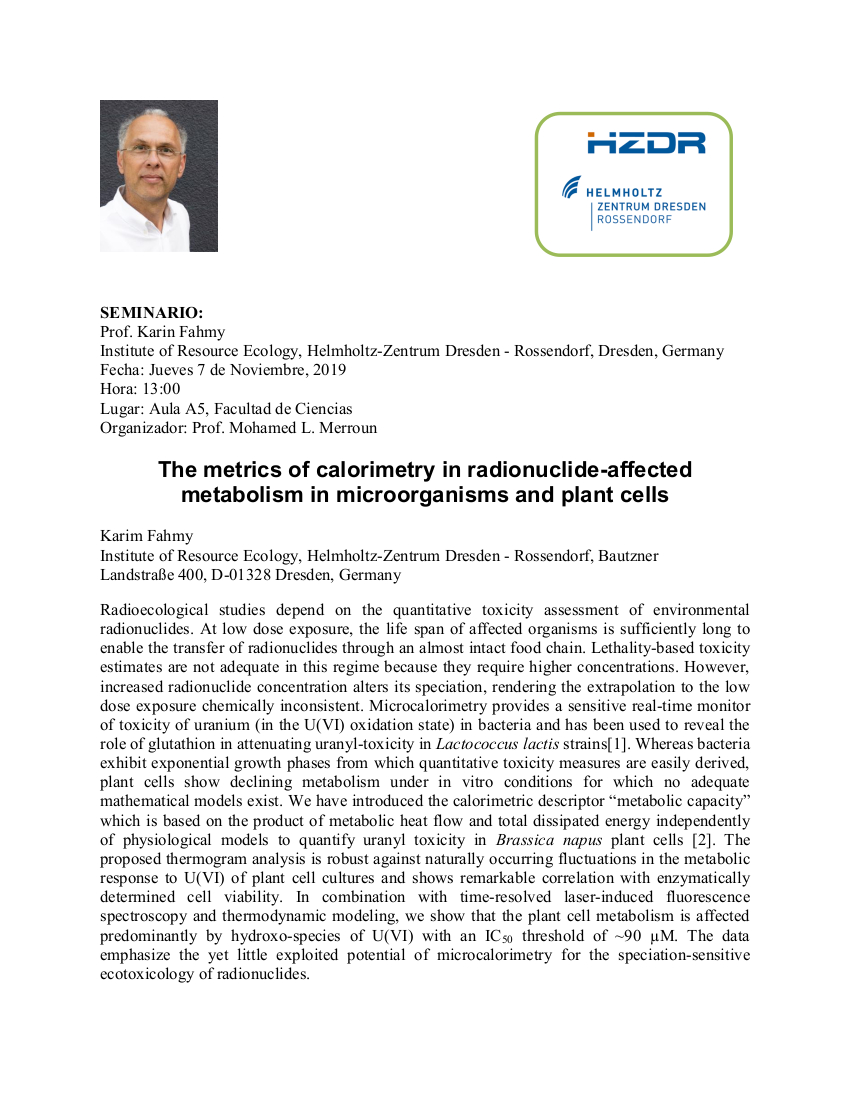Fecha: Jueves 7 de Noviembre, 2019.
Hora: 13:00.
Lugar: Aula A5, Facultad de Ciencias.
Ponente: Prof. Karin Fahmy. Institute of Resource Ecology, Helmholtz-Zentrum Dresden - Rossendorf, Dresden, Germany.
Organizador: Prof. Mohamed L. Merroun.
Radioecological studies depend on the quantitative toxicity assessment of environmental radionuclides. At low dose exposure, the life span of affected organisms is sufficiently long to enable the transfer of radionuclides through an almost intact food chain. Lethality-based toxicity estimates are not adequate in this regime because they require higher concentrations. However, increased radionuclide concentration alters its speciation, rendering the extrapolation to the low dose exposure chemically inconsistent. Microcalorimetry provides a sensitive real-time monitor of toxicity of uranium (in the U(VI) oxidation state) in bacteria and has been used to reveal the role of glutathion in attenuating uranyl-toxicity in Lactococcus lactis strains[1].
Whereas bacteria exhibit exponential growth phases from which quantitative toxicity measures are easily derived, plant cells show declining metabolism under in vitro conditions for which no adequate mathematical models exist. We have introduced the calorimetric descriptor “metabolic capacity” which is based on the product of metabolic heat flow and total dissipated energy independently of physiological models to quantify uranyl toxicity in Brassica napus plant cells [2]. The proposed thermogram analysis is robust against naturally occurring fluctuations in the metabolic response to U(VI) of plant cell cultures and shows remarkable correlation with enzymatically determined cell viability. In combination with time-resolved laser-induced fluorescence spectroscopy and thermodynamic modeling, we show that the plant cell metabolism is affected predominantly by hydroxo-species of U(VI) with an IC50 threshold of ~90 μM. The data emphasize the yet little exploited potential of microcalorimetry for the speciation-sensitive ecotoxicology of radionuclides.
References
1. Obeid, M., Oertel, J., Solioz, M. and K. Fahmy, Mechanism of attenuation of uranyl toxicity by glutathione in Lactococcus lactis. Appl. Environ. Microbiol., 2016. 82(12) 3563-3571.
2. Sachs, S., Geipel, G., Bok, F., Oertel, J. and K. Fahmy, Calorimetrically determined U(VI) toxicity in Brassica napus correlates with oxidoreductase activity and U(VI) speciation.
Environ. Sci. Technol., 2017. 51(18) 10843-10849.
Biography
Karim Fahmy received his PhD at the University of Freiburg in membrane protein research. During his postdoc studies as a Howard Hughes Medical Institute Fellow with Prof. Tom Sakmar at Rockefeller University, New York, he performed seminal work in combining site-directed mutagenesis with infrared spectroscopy to elucidate functional mechanisms of G protein-coupled receptors. After his habilitation at the University of Freiburg he joined the Helmholtz-Zentrum Dresden-Rossendorf heading the Department of Biophysics, where his lab focuses on the design of novel membrane mimetics for structural studies of membrane proteins based on DNA-lipid assembly. Recent work in Systems Biology uses calorimetry for metabolic activity analyses. Karim Fahmy is affiliated Professor at the University of Dresden. He has headed the Molecular Biophysics Section of the German Biophysical Society and is recipient of the Hans-Griesebach-Price of the University of Freiburg.
Escribir un comentario
Información básica sobre protección de datos personales
Responsable: Universidad de Granada
Legitimación: La Universidad de Granada está legitimada para el tratamiento de sus datos, siendo de aplicación las bases jurídicas previstas en el art. 6.1 del RGPD que correspondan en función de la finalidad pretendida por usted en el formulario de contacto.
Finalidad: Gestionar su comunicación.
Destinatarios: No se prevén comunicaciones de datos, salvo que sea necesario para gestionar su solicitud.
Derechos: Tiene derecho a solicitar el acceso, oposición, rectificación, supresión o limitación del tratamiento de sus datos, tal y como se explica en la información adicional.
Información adicional: Puede consultar la información adicional y detallada sobre protección de datos, en función del tipo de tratamiento, en la UGR en el siguiente enlace





